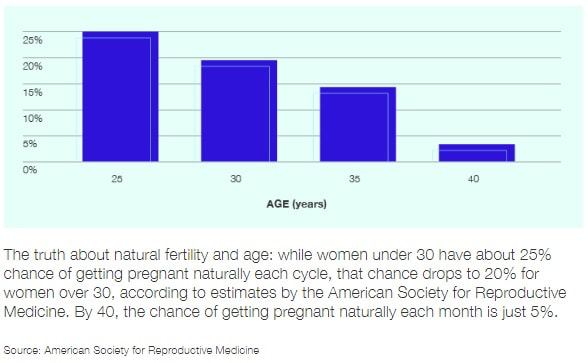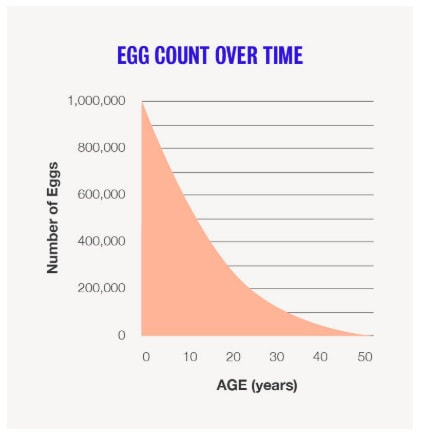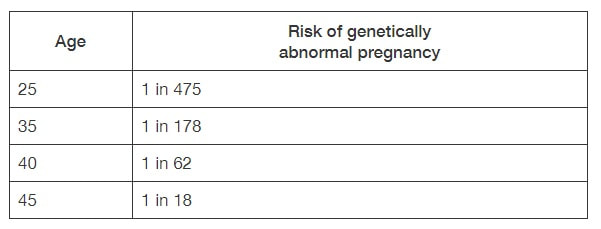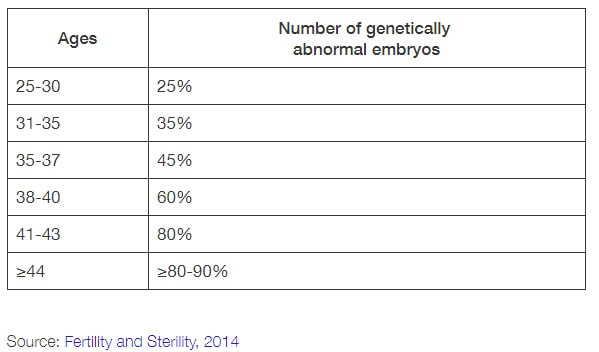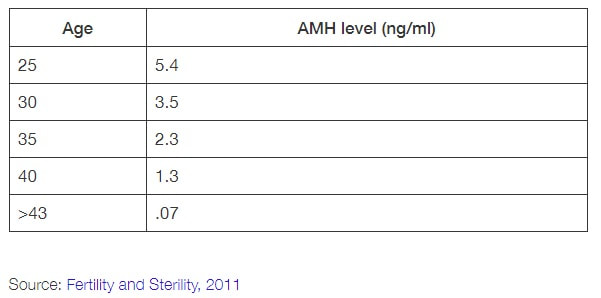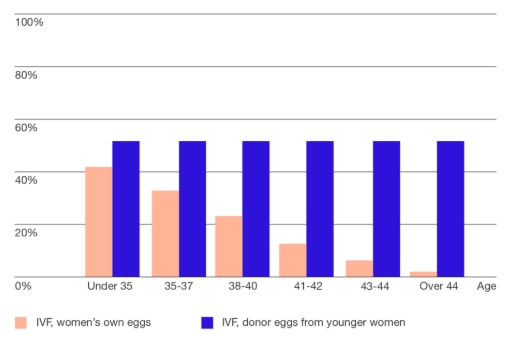Age & Infertility
|
Why Age Matters
The lists of things that can cause infertility seem endless. Nevertheless, one single factor does play a highly significant role in female infertility - her age. Understanding why and how age affects infertility can help you determine the best time to start your family. A fertility assessment can be done at any age to help decide your best course for the future. FERTILITY STATISTICS BY AGE: Monthly chance of pregnancy each month As a woman ages, her chance of natural pregnancy drops from around 25% at age 25 to less than 5% at age 40. |
Pregnancy Rates and Age
Beginning in your early 30′s pregnancy rates begin to decline, taking a sharp turn downward around age 35 and continue downward even faster through 40. When a woman is 30, just 7% of couples are infertile; by 40 that number grows to 33%.
Why does this happen? What factors are contributing to this loss of fertility as a woman ages?
Beginning in your early 30′s pregnancy rates begin to decline, taking a sharp turn downward around age 35 and continue downward even faster through 40. When a woman is 30, just 7% of couples are infertile; by 40 that number grows to 33%.
Why does this happen? What factors are contributing to this loss of fertility as a woman ages?
|
FERTILITY STATISTICS BY AGE: Egg Count Over Time
A woman is born with all the eggs she’ll ever have, which at birth, is typically around 1 million. By puberty, she usually has half that—and each month after puberty, she loses up to 1,000 eggs. Of those, only one egg is matured and ovulated each month. Source: Wallace W, Kelsey T. Human Ovarian Reserve from Conception to the Menopause. PLoS ONE 2010; 5(1). |
Age Related Declines In Fertility: Egg Quality & Quantity
Egg quality is the ability of your eggs to become fertilized. Every woman is born with a certain number of eggs in her ovaries, ready to be released for fertilization and pregnancy in her reproductive years. Egg quantity refers to the number of eggs you have. At birth women have about 2,000,000 eggs and by puberty just 400,000. Some eggs will mature and be released in ovulation, many are lost daily in the process. Even when we are young, only a minority of these total eggs will be of fertilization quality. That’s because for fertilization to occur, the egg must have the proper number of healthy chromosomes to develop into an embryo and, eventually, a baby.
The quality of eggs decline as we age. The eggs are less able to form a healthy embryo. There are fewer antral follicles to produce an egg each cycle, which decreases the chances of producing quality eggs for fertilization. This is not to say that the eggs are of poor quality just because you’re older. Some younger women can have poor quality eggs as well.
Egg quality is the ability of your eggs to become fertilized. Every woman is born with a certain number of eggs in her ovaries, ready to be released for fertilization and pregnancy in her reproductive years. Egg quantity refers to the number of eggs you have. At birth women have about 2,000,000 eggs and by puberty just 400,000. Some eggs will mature and be released in ovulation, many are lost daily in the process. Even when we are young, only a minority of these total eggs will be of fertilization quality. That’s because for fertilization to occur, the egg must have the proper number of healthy chromosomes to develop into an embryo and, eventually, a baby.
The quality of eggs decline as we age. The eggs are less able to form a healthy embryo. There are fewer antral follicles to produce an egg each cycle, which decreases the chances of producing quality eggs for fertilization. This is not to say that the eggs are of poor quality just because you’re older. Some younger women can have poor quality eggs as well.
|
What Happens When Egg Quality & Quantity Declines?
Fewer eggs coupled with a higher percentage of eggs with poor quality can lead to:
FERTILITY STATISTICS BY AGE: Risk of Genetically Abnormal Pregnancy by Age
For the women who do achieve pregnancy, the chance of genetic abnormality—resulting in miscarriage or disorders like Down syndrome—increases exponentially as a woman ages, from .2% in her 20s to 5% in her 40s. That’s why eggs frozen when a woman is in her 20s or early 30s are much more likely to result in a healthy pregnancy, even when used later. |
FERTILITY STATISTICS BY AGE: Number of Generically Abnormal Embryos by Age
Egg quality is diminished over time (AKA with age), as a woman is exposed to all of the inevitable forces of everyday life—illness, toxins, free radicals, fever, and more—that can damage the DNA inside her eggs. That’s why, as a woman gets older, it’s more likely that she’ll have genetically abnormal eggs, resulting in no pregnancy, miscarriage, or genetic disorders for the baby. |
Can You Test Egg Quality Or Quantity?
There are two reasons one may want to have testing done to determine egg quality and/or quantity: they would like to know what their future fertility potential is, or they're having trouble conceiving now.
For either reason, there are tests available that can help determine the quantity of eggs you have remaining in your ovaries. This is called ovarian reserve testing and typically involves a Day 3 FSH. This blood test measures the level of follicle stimulating hormone (FSH) in your blood on day three of your menstrual cycle. When you have many eggs, you release less FSH to recruit an egg each month, but as we age, more is needed to recruit an egg for development and ovulation.
There is another blood test that can be done at any time in the menstrual cycle called the Anti-Mullerian Hormone (AMH). This test also helps determine ovarian reserve.
An ultrasound to document the antral follicle count of each ovary should be performed at the beginning of your cycle. This count allows us to determine the quantity only.
The quality of the eggs being produced can only be measured through ART procedures such as IVF and PGD.
There are two reasons one may want to have testing done to determine egg quality and/or quantity: they would like to know what their future fertility potential is, or they're having trouble conceiving now.
For either reason, there are tests available that can help determine the quantity of eggs you have remaining in your ovaries. This is called ovarian reserve testing and typically involves a Day 3 FSH. This blood test measures the level of follicle stimulating hormone (FSH) in your blood on day three of your menstrual cycle. When you have many eggs, you release less FSH to recruit an egg each month, but as we age, more is needed to recruit an egg for development and ovulation.
There is another blood test that can be done at any time in the menstrual cycle called the Anti-Mullerian Hormone (AMH). This test also helps determine ovarian reserve.
An ultrasound to document the antral follicle count of each ovary should be performed at the beginning of your cycle. This count allows us to determine the quantity only.
The quality of the eggs being produced can only be measured through ART procedures such as IVF and PGD.
|
FERTILITY STATISTICS BY AGE: Anti-Mullerian Hormone Levels by Age
Anti-Müllerian hormone, or AMH, is a protein hormone produced by special cells inside the ovarian follicles. The level of AMH in the blood can help doctors estimate the number of follicles inside the ovaries, and therefore, the woman’s egg count. A typical AMH level for a fertile woman is 1.0–4.0 ng/ml; under 1.0 ng/ml is considered low and indicative of a diminished ovarian reserve. |
|
Treating Age Related Infertility
If you are having difficulties getting pregnant, and learn it is due to the aging process, you do have some options. Fertility drugs can help increase the number of eggs your ovaries release every month. This increases your chance of releasing a quality egg for fertilization. There are a wide variety of fertility drugs available. |
Preserving Fertility for Future Parenthood
Egg freezing, while you're young, provides peace of mind - eggs are frozen in time and the age you were when they were vitrified (frozen). For example, if you decided to freeze eggs when you were 28 years old, then decided at 38 years old that you wanted to use them to achieve pregnancy, those eggs are your 28 year old eggs, even though you are 38 years old. A Fertility Assessment can help you decide if Egg Freezing is right for you. |
|
In-Vitro Fertilization (IVF) may be an option to help retrieve more eggs from your ovaries with high doses of injectable medications. In this way, you may be able to maximize the number of embryos possible, giving you the best chance that a healthy embryo will be created. And egg donor can also be used to achieve pregnancy.
FERTILITY STATISTICS BY AGE: Chance of Pregnancy Using IVF with Your Eggs versus Donor Eggs by Age Many believe that in vitro fertilization, or IVF, is an effective way to treat age-related infertility. In reality, success rates for iIVF using a woman’s own eggs, of the same age, drop drastically in the 30s and hover in the low single digits for women over 44. In contrast, the success rates for women using young eggs—like from a donor or from themselves, frozen before 35—stay stable at about 50%. |

